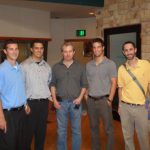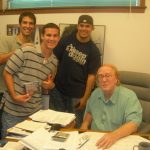After college, California author Rick Barrera found himself out of a job. Although he helped establish a store, under the tutelage of a retail marketing guru and mentor, and was well on his way to buying it, the opportunity instead went to the family of the owner. The son of a restaurateur, Rick set out to find a way to communicate all that he had learned in his life, to the world in need of inspiration, and coaching in the tumultuous world of sales.
What came of his attempt are numerous books about scrupulous marketing, something Rick sees as lacking in today’s society.
“Integrity,” says Rick, “Is key to everything. It’s clarity of values, doing what you say you’re going to do.” Rick’s books offer his method of selling without misleading, gimmicks, or dishonesty. Rick focuses on a customer oriented sense of business, where seeing from the customer’s point of view is vital. Everything from the connotation of words used, to the empathy required to understand the
fickle choices of customers. When asked for advice to those searching for their path, Rick offers this: “Even if you don’t have financial success for some reason, make sure to enjoy every day of what you’re doing.”
INTERVIEW
I was working for a marketing genius in retail. A guy named Jack Bloomenthal. Who took what was a newspaper stand on the corner and turned it into a multimillion dollar retail store. So I was working for him my senior year in college. He and I got along really well and I was doing a great job for him and I was working full time. So, we thought I was I going to buy the store from him. That’s where we were headed. And then his son decided to come back and take over the store. So I was unemployed and listless looking for my next move. Did a couple of other things in between…various things, one of which, I really really really hated (Laughs). Which galvanized me. Because I went from something I loved and was passionate about.
We sold in this retail store: cameras, guns, motorcycles, sporting goods, stereos, and audio visual equipment. Our motto was: ‘If you need it, we don’t have it. If you want it, we’ve got it.’ It was all passion. I was a photographer. Stereos, how you could you not love that? Motorcycles? It was just, great. And so, I got jettisoned out of that and took this job, because it was there.
What was that that didn’t like at all?
I was selling. But it was industrial equipment. Stainless steel tubings and fittings and plasticos. I was not terribly passionate about it. So that contrast really galvanized for me the distinction between pursuing your passion and pursuing money. And a job that was something you were not passionate about.
And so, I went on a long road trip. At about North Carolina, it was cooking at a hundred degrees on a plastic sofa. I was sacked out on one of my friend’s plastic sofa. And I said, ‘What do I want to do with my life. What do I really, really want to do with my life?’ What I decided was I wanted to teach people about business. What I had learned from my father and Jack about how to run a really successful business.
The two of them had a very consistent viewpoint. It was really thinking about every aspect of the business. Every touchpoint of the business. From the customer’s standpoint. How would the customer like to pay?
My father had a series of restaurants and I’d be sitting on the barstool in an empty restaurant and he’d unlock the door for the day and he’d say, ‘Get out of that stool.’ And I’d say, ‘Why? I’m the only person in the building!’ And he’d say, ‘A customer might come in.’ And I’d say, ‘Well, they can sit over there.’ And he’d say, ‘No. What if they want that stool?’ I’d say, ‘Why would they want this stool?’ And he’d say, ‘It doesn’t matter. If they want that stool, and you’re in it, they won’t sit in it. And if it’s their favorite stool, then they won’t be happy. So you have to get out so they can sit.’
So it was really thinking from the customer’s viewpoint about the entire business. And when I went to work with Jack it was the same thing. I remember this woman came in and she said, ‘I bought this camera two years ago and I just took it out and it’s not working. I’m going on vacation tomorrow. I don’t know what to do. I don’t have time to send it in.’ Jack just reached in the case and gave her a brand new camera in the box and said, ‘Here. Have a good time on vacation. Let me give you a couple rolls of film to go with it.’ I was shocked. ‘Jack! What are we going to do we this…and inventory!’ All the operational issues involved with that. And he said, ‘She’s going on vacation. She needs a camera. Why are we here? We’re here, to serve them. That’s what it’s about.’
So with working with my father and working with Jack and getting that perspective and then looking at the way a lot of corporate works, I could see there was this huge gap between the two. They get so operations focused and they get so focused on the silos and machine, that they completely lose focus of why they exist in the first place. Which is to take care of the customer.
Everything I’ve done for the last twenty-five years has been really focused on bringing the voice of the customer, the viewpoint of the customer into the organization.
We started doing customer service training. Twenty five years ago. Nobody did customer service training twenty five years ago. They would say to me, ‘Why would we train our front line? They turn over.’ But they’re your interface with the customer! How could you not train them?
Now, everyone does it. You wouldn’t think of having a front line without some kind of customer service training. But back then, nobody did. They thought we were crazy. And then, we started doing sales training, again with the same mindset of not how do you push the products out of the organization from the organization standpoint, but from the customer’s viewpoint of how would you want to interface with an organization.
So we wrote a book called Non Manipulative Selling. It was the first time, ever, that the concept was put into print. That the buyer and the seller shouldn’t be adversaries, but partners in the process. No one else had ever put that in print before. People thought we were crazy. We got thrown out of companies when we got thrown out of companies. They would literally evict us from the building when we told them they should partner with their customer. They thought we were nuts.
Today, that’s pretty standard philosophically, but still the methodologies they use, the closing strategies, the overcoming objections. They still talk about probing. Think about if you came to buy something from me, or I was in your office and I said, I’m going to probe you now. How comfortable would you be?
The language, the mindset about how we deal with that is crazy. We said, ‘Look. They have needs. You have needs. How do you get together? Where do your two circles intersect where it makes sense to do something together?’ So we wrote a book called Non Manipulative Selling. Subsequently, Collaborative Selling, which was taking the idea to the next level. I’ve developed a third generation of that now.
And then we started looking at the branding piece. Most people, as soon as you say the word ‘brand,’ they think that branding is marketing. Marketing is advertising. Advertising is television advertising. Since my job doesn’t have anything to do with television advertising, I don’t have anything to do with the brand. That couldn’t be further from the truth. Because all the brand is, is the sum total of the customer experiences that a company delivers.
So if you think about Starbucks, and I ask you what’s your opinion of Starbucks, you’d say what?
Starbucks is everywhere. Coffee.
Do you like it? Do you like going there?
I’m not a big coffee drinker. I know that my parents love it and they will go out of their way to find one.
Why? Because it’s a very consistent experience that they’ve created that is set around the customer.
So they start with that point of view. When you gets lots and lots and lots of customers who are saying nice things about you, that’s your brand. Your brand is really your reputation. So what do you want your reputation to be?
It goes right back to the very first principle that my father taught me. Focus on the customer. It’s what Jack said. Focus on the customer. So that’s what this book is all about. How do you start with the viewpoint of the customer? How do you put that point of view at the core of your business, and then build everything you do around that, and align to deliver that customer experience that is something they want to repeat and repeat and tell other people about?
That’s what creates a very strong brand. Like Starbucks. Like Apple. Apple sold a half a million phones this weekend. How do they do that? It’s not because the phone itself was necessarily so great. People hadn’t even seen it until this weekend. Why did they want it so much? It’s because Apple has this history, this brand, this reputation, that everything they do is cool.
Being consistently innovative with great interface.
Exactly. Great design. Graphical interface. Intuitive interface.
And almost sometimes their technology seems a little ahead of the time, and difficult for amateurs, but by doing that the people who are the best at what they do often use the Apples and people see that so they interpret it as being the best device out there.
Yep. So what happened is their reputation is so powerful that they said they were going to build a phone, and a half a million people said give it to me. I trust you. Why? Because they focus on the customer. They create great customer experiences. That’s really what it’s all about.
So when, you had that idea on your friend’s plastic couch in a hundred degree heat, you’re sitting there, you have this concept and viewpoints, but still, at that young age, you don’t really have the experience, I guess. Or did you?
Well, I had a lot of part time experience. I had some full time experience in college because I worked full time the whole time I was going through college. So I didn’t have twenty years of experience, but I had some experience. And so for me, it was about leveraging what I had.
I started with small businesses. I went door to door. And I said I can help your front line people focus on the customer. I can help your sales people think about the customer. I can increase your sales by helping them focus on the customer.
What was their reaction to that?
Most people thought I was crazy. Most people threw me out. But some didn’t. So I had the initial clients.
My first client, talk about a wacko story, my car broke down in the middle of the street. I was broke. I was starting this new company. I had no money. I’m totally broke. And there’s my car sitting in the middle of the street and I didn’t know what to do. So I walked to the nearest gas station. I asked them if they could get my car over here and fix it.
They called me up and said it was going to be $1575. (Whistles) Ah geez. I don’t know if you’re familiar with Napoleon Hill.
I just bought his book.
Okay. He says with every adversity is the seed of equivalent benefit. So I’m literally sitting there on the phone with $1575 of equivalent benefit. Where is the equivalent benefit? And I said to the guy, ‘Have you ever given any thought to sales training for your people?’ This is a gas station. I know this is a long shot, but I’m throwing the Hail Mary pass. And he says, ‘Well, what do you mean?’ I said, ‘I do sales training. I’m thinking that with these kind of prices, that some sales training for your people would go a long way. If you get a couple extra customers a month, it’d be worth it.’ He said, ‘Come over tomorrow and we’ll talk about it.’ He was my first client.
I actually sold him $3,000 worth of training. I got $1500 of mine, and $1500 of credit at the gas station. What’s cooler than that? You pull in, pull up, pull away. It was great. I used him as a referral. Trained his two sons. They were very happy with it and they told other people. I started getting other retailers.
Did he know that he was your first client?
Nooo.
That’s the oversell, kinda?
No, no, no. That point was, deliver value. He got way more than his value and what I did is made a deal for these folks because I was running regular classes. What I said is, ‘If you sign up with me, all of your people can take my classes, forever.’ You hire new people, you send them to my classes. It’s free. Because you’re one of my inaugural clients.’ Some of them sent people for years. Every time they’d get a new person, they’d send them to class. It didn’t cost me anything because I was doing the class anyway.
That’s how it started. I got a carpet company as another one. Then an automotive stereo company. My big break came with a guy named Corky Cantowsky. He was the manager for a big television station. They had a reputation for having the best sales force in the industry. I talked to him, he talked to his boss, and they bought this package. I trained all of his sales people. Everyone found I was training his sales people, who were already the best people in the city, and that was it. That was the breakthrough.
From there it took off.
Why are you passionate about delivering this service to companies?
My highest value, personal value, and Walt Disney had a great quote- ‘Decision making is easy if there are no conflicts in your value system.’ By that, you have to rank what’s important. Whenever two of them come into conflict, you see which one is more important on the list. It’s an automatic decision.
Most companies, when they do their values, they just put up a bunch of words on the wall. They don’t rank them. They don’t look at them. When they’re ranked, it really changes things. What’s number one? Shareholder value? Client service? Being a good member of the community? What do you value?
You look at someone like Patagonia, it’s about being environmentally friendly. Whenever they have a choice to make, they look at using organic cotton. Because we know that using inorganic cotton is not good for the earth. So if it costs us more, we can’t sell our products, we have to figure that out. But it’s not okay to make that decision any other way. They’re clear about their values.
For me, my highest value is integrity. It’s about doing what you say you’re going to do. It’s about really putting it out there in a straightforward way. To me, that’s what’s missing in a lot of business today. It’s about how to manipulate the client. How do we trick them, what’s our gimmick, how do we market? How do we, in some way, not be honest and straightforward. And I hate that. I think that you can get very very rich by being very straightforward. And very forthright and very open. That’s the message. That’s why I’m so passionate about it. To me, you make more money.
You look at Apple and Starbucks and they’re ripping it up. Why? Because they are straightforward. It’s the Italian bar experience. How do you want it? Do you want it with two pumps or three pumps? In a cup, a bowl, you tell me how you want it. I’ll make it for you, I’ll charge you a lot of money because I’m customizing your coffee. But that’s okay, because you get what you want, and I get what I want. It’s a good deal.
To me, that’s the essence of it, is that if I can get that message across, then it builds a better world. We have better corporations, they’re more profitable, the customers win, and it’s sustainable.
So integrity is obviously what you said is the most important. But as a sales person, customer service is the most important aspect as opposed to price point or marketing. Customer service is what you would focus on?
If you think about price, it’s a teeter tooter. There’s the price on the one side of the teeter tooter, and there’s what you’re delivering in terms of value on the other. So if you have a high priced product, you better have a big value bundle to balance it out. So it’s really about getting close enough to the customer to identify where the value is. What do they want?
Why am I willing to pay Starbucks three or four bucks for a cup of hot chocolate? Well, because they’re smart enough to figure out that if you put a little vanilla in the hot chocolate, it makes the hot chocolate taste better. I’m willing to pay for that insight. It tastes better. It gives me what I want.
Can I do that at home? Yeah, I can. If I go out and buy the vanilla, chocolate, milk. Heat it up. Is it worth it to me? No. It’s three bucks. You do it. It’s a whole lot easier. You can buy espresso for sixteen hundred dollars and put it in your kitchen, but then what? Now it’s in your kitchen. It’s not next to your office. It’s not next to the kids soccer game.
What am I willing to pay for the convenience? You identify what the customer really wants. Then you give it to them. It’s very straightforward. To me it’s not about selling them something they don’t need or don’t want. It’s about getting close enough to them. Interviewing them, getting inside their head.
If you make it really simple, easy, and legal to download music and take it with me, and I don’t have to worry about viruses. I’ll pay you. For an iPod. That’s all it is.
Go back to the Sony story, the original iPod as I like to call it. The Sony Walkman. How did it come about? They were on the golf course, and he said to his friend that it’d be great if they had some music out here. Well, how small would a stereo have to be in order to carry it everywhere you went. This is critical insight. Everywhere you went. How small would it have to be?
His friend thought about it, and said, the size of a paperback book. So he took a paperback book into his engineers and asked how long it would take to build a high quality stereo the size of that book. They said five years. He said great, you have eighteen months. Eighteen months later they came out with the Walkman.
So don’t customize the sale. Customize the service and the product.
Right.
So you’re a natural storyteller. Have you always been?
My father used to tell stories at the dinnertable. Every night. If you can’t tell a story, you can’t be a Barrera.
My father was a college professor. My mother was an English teacher. High value placed on education in the household. What did you learn today? How does it apply to your life?






